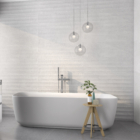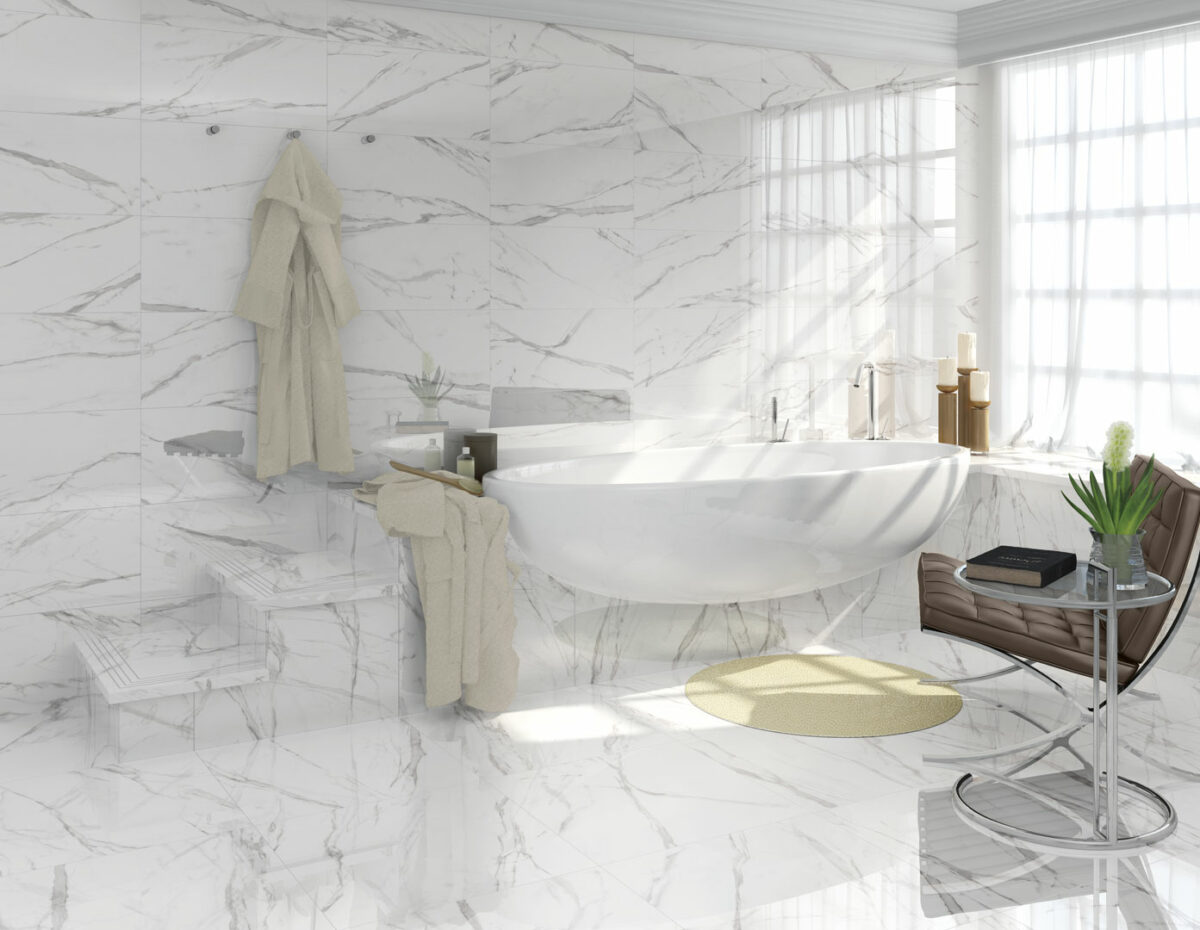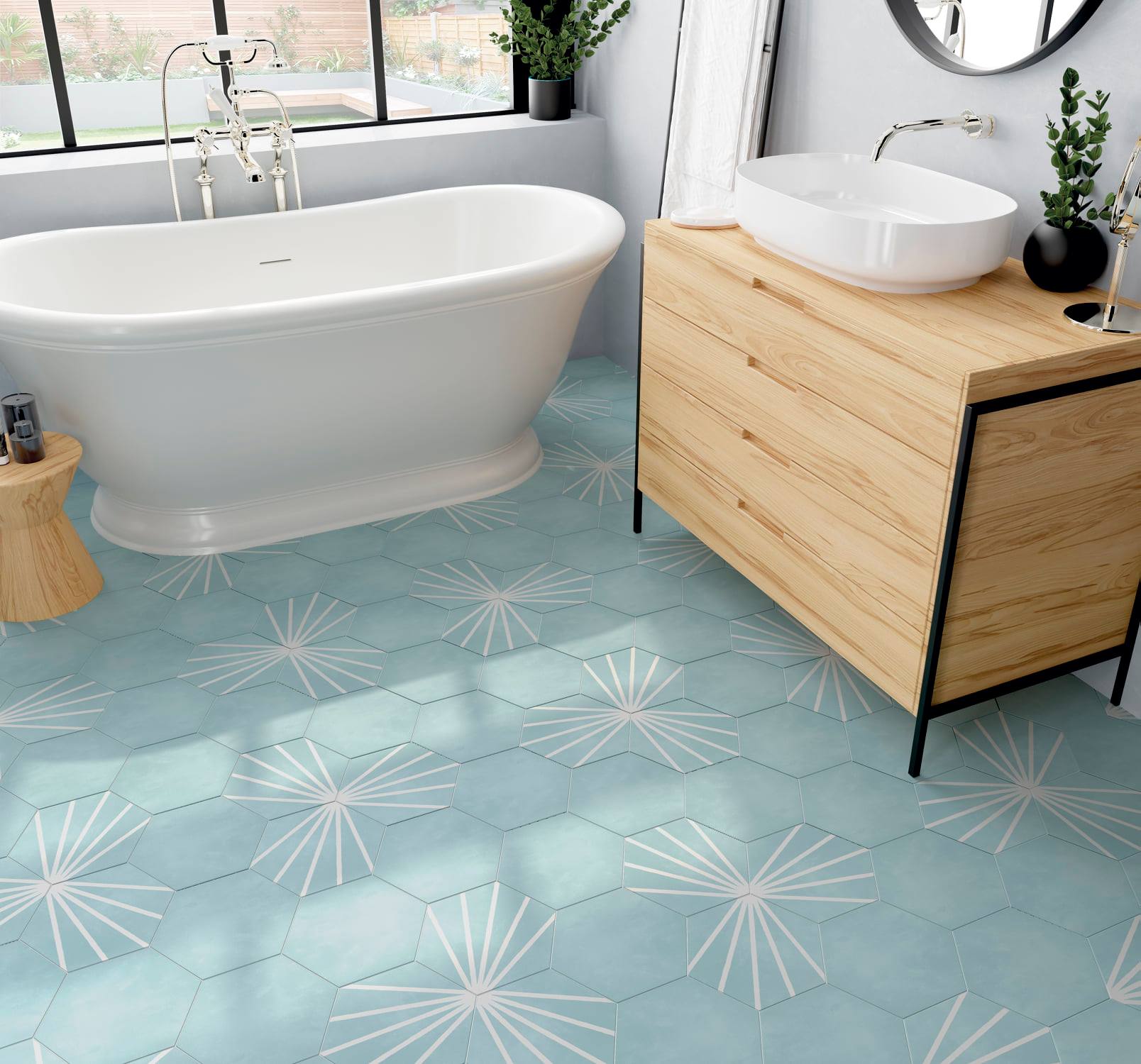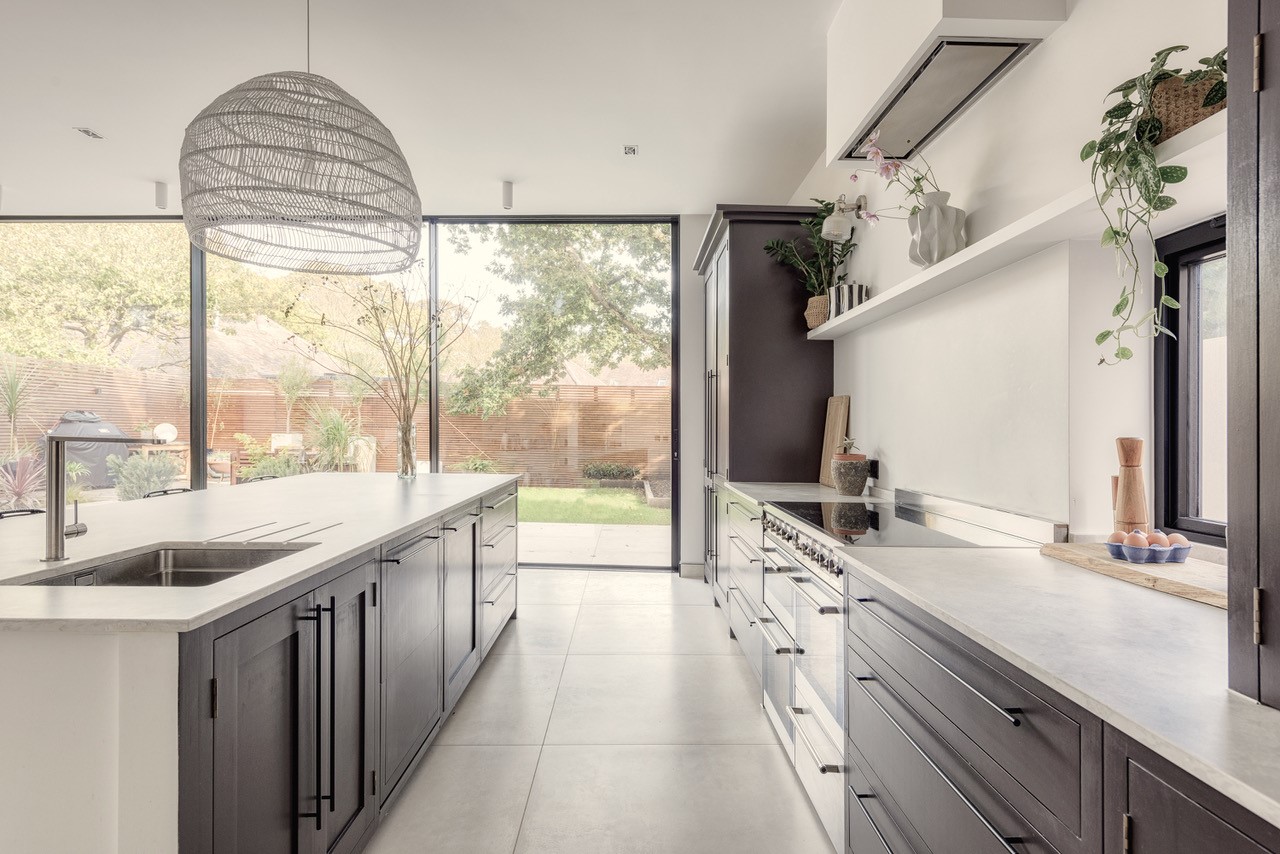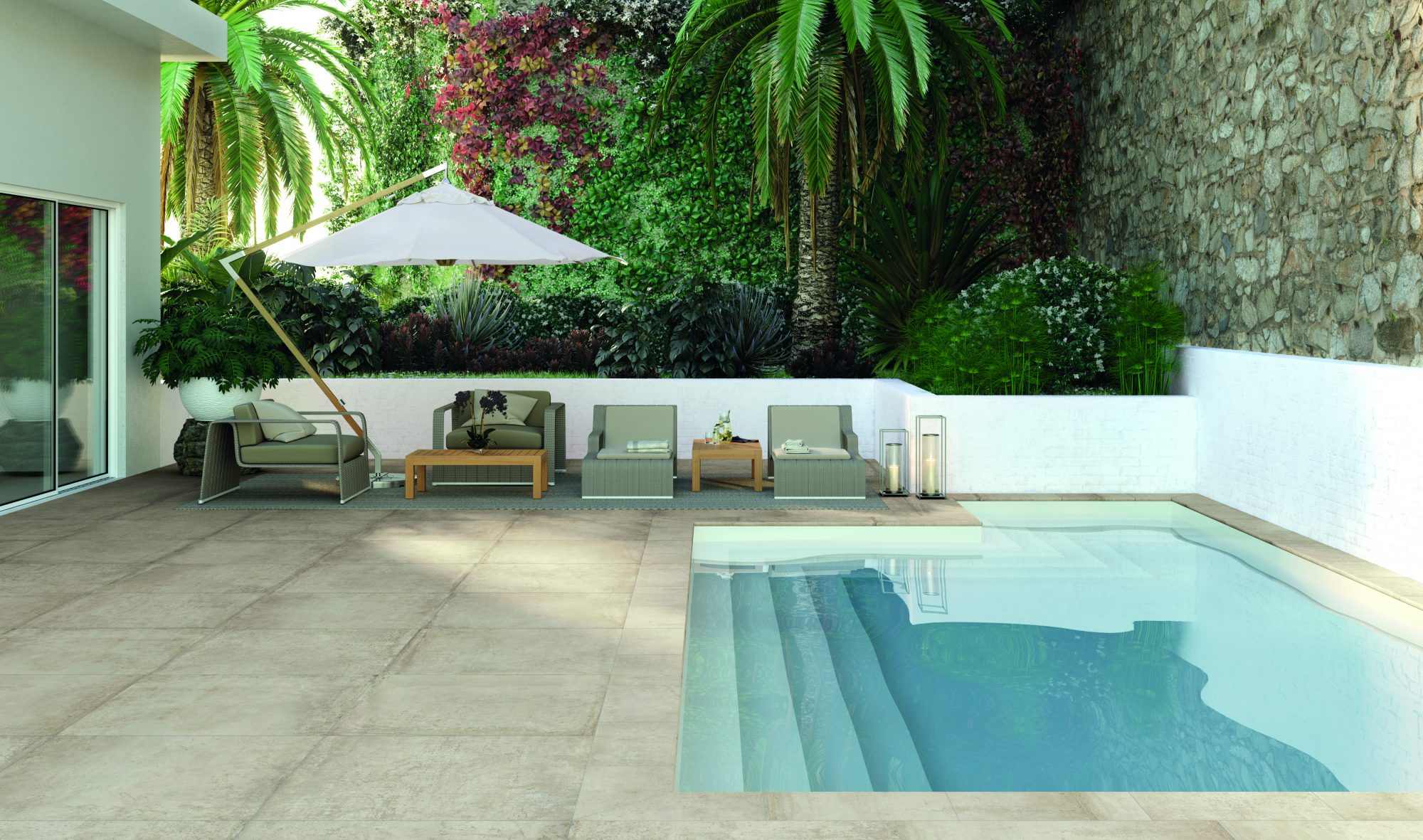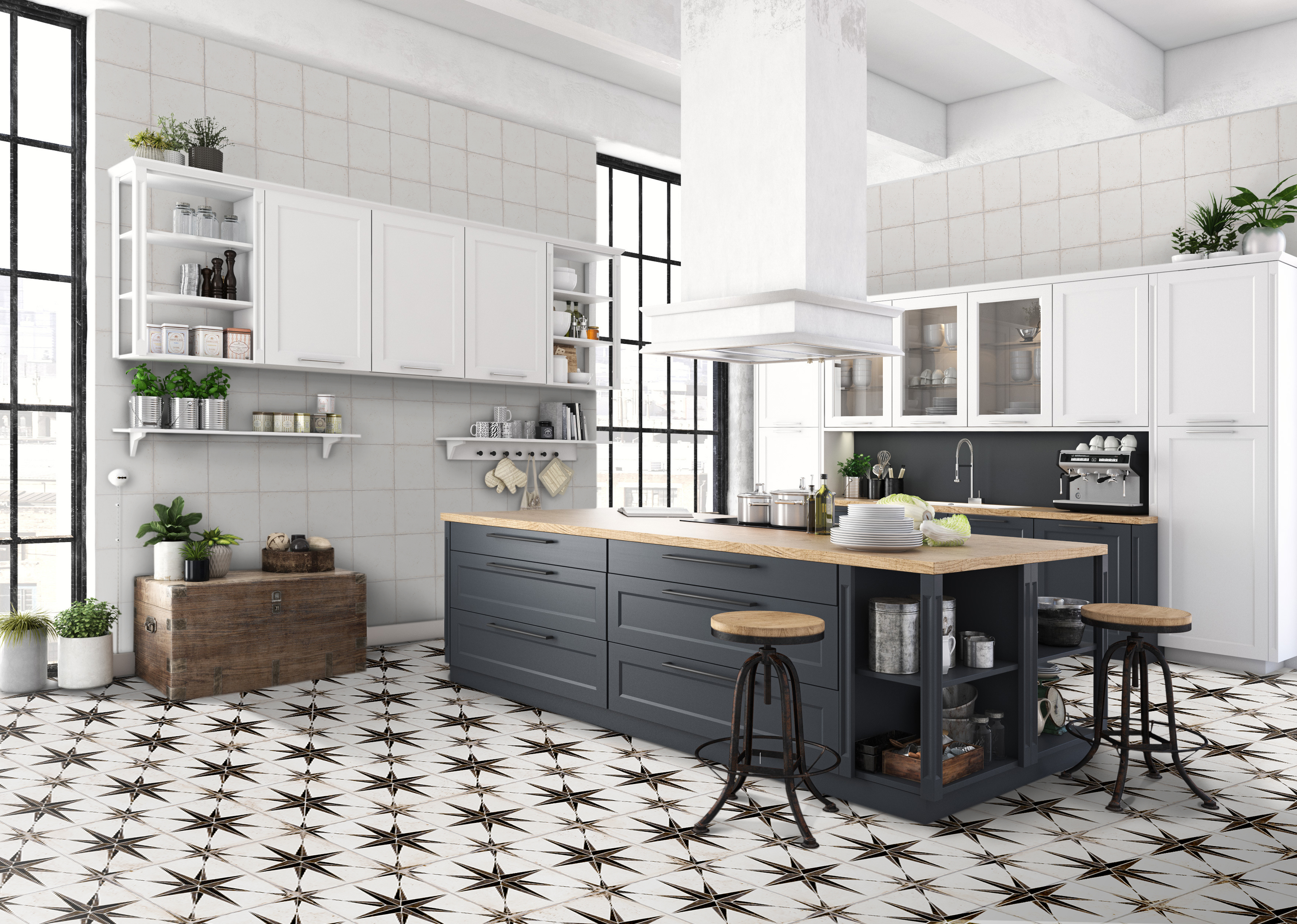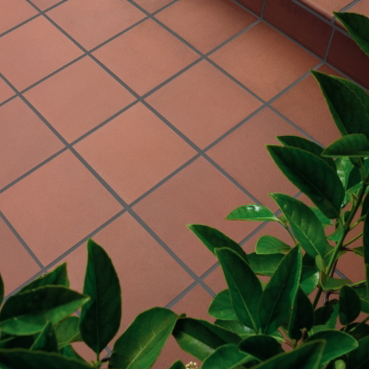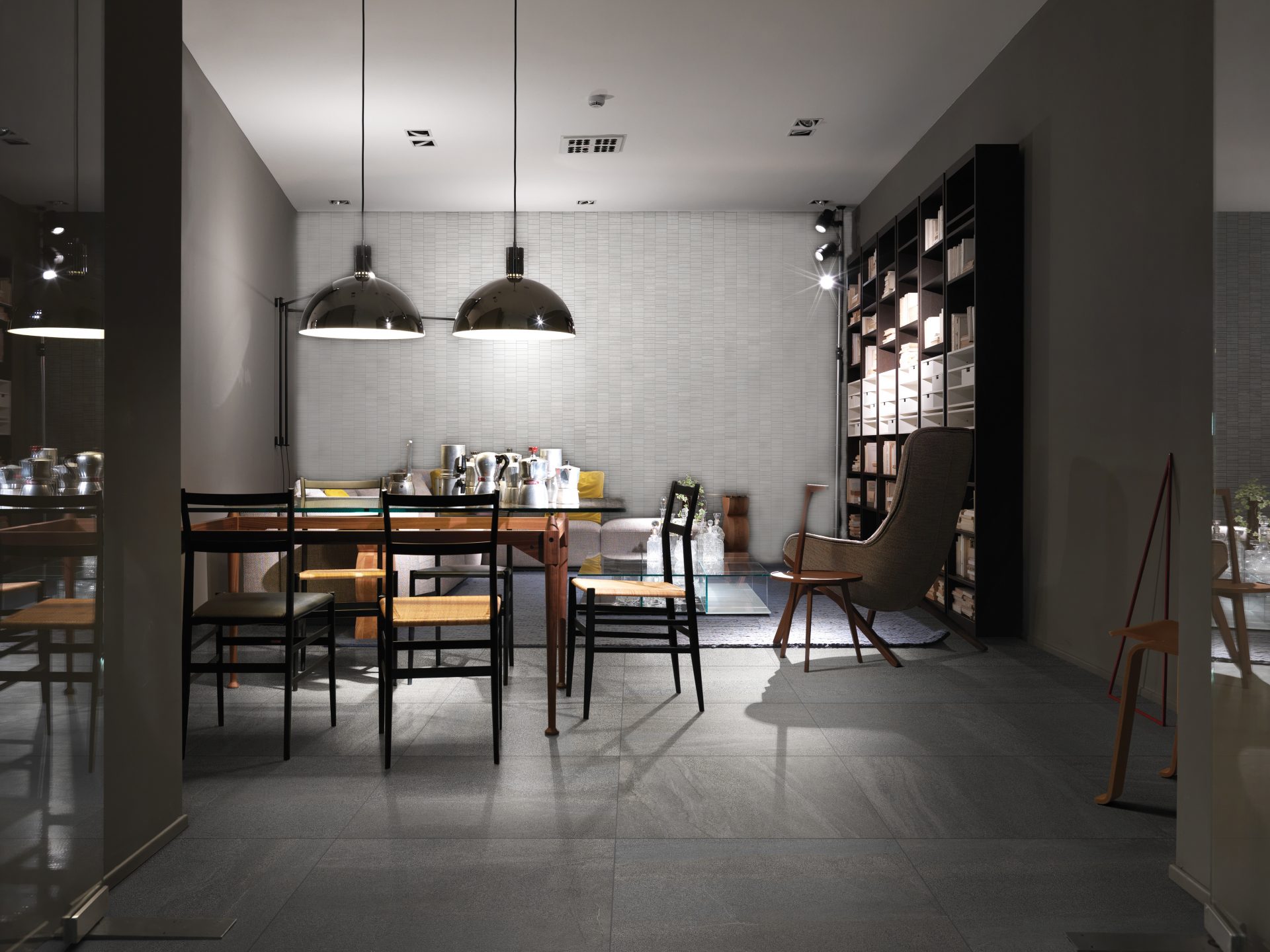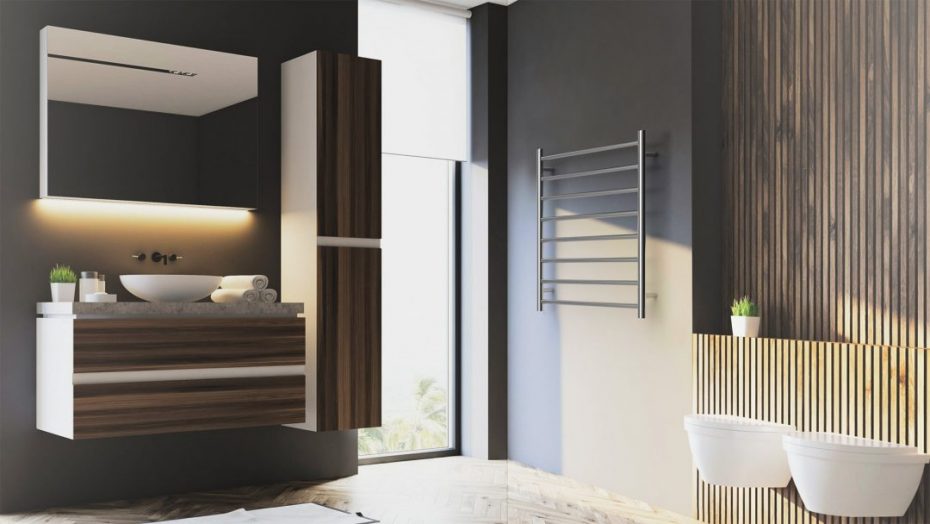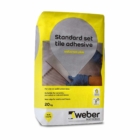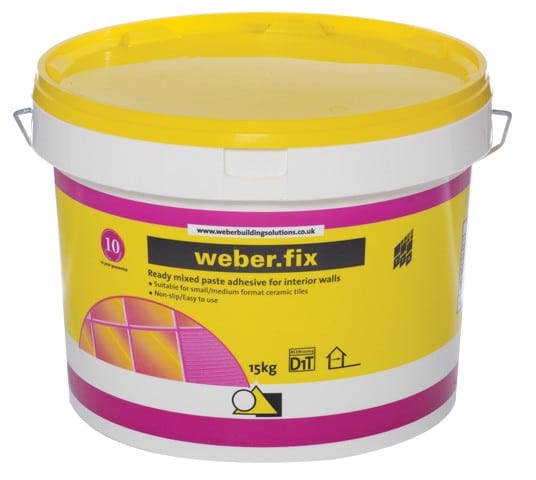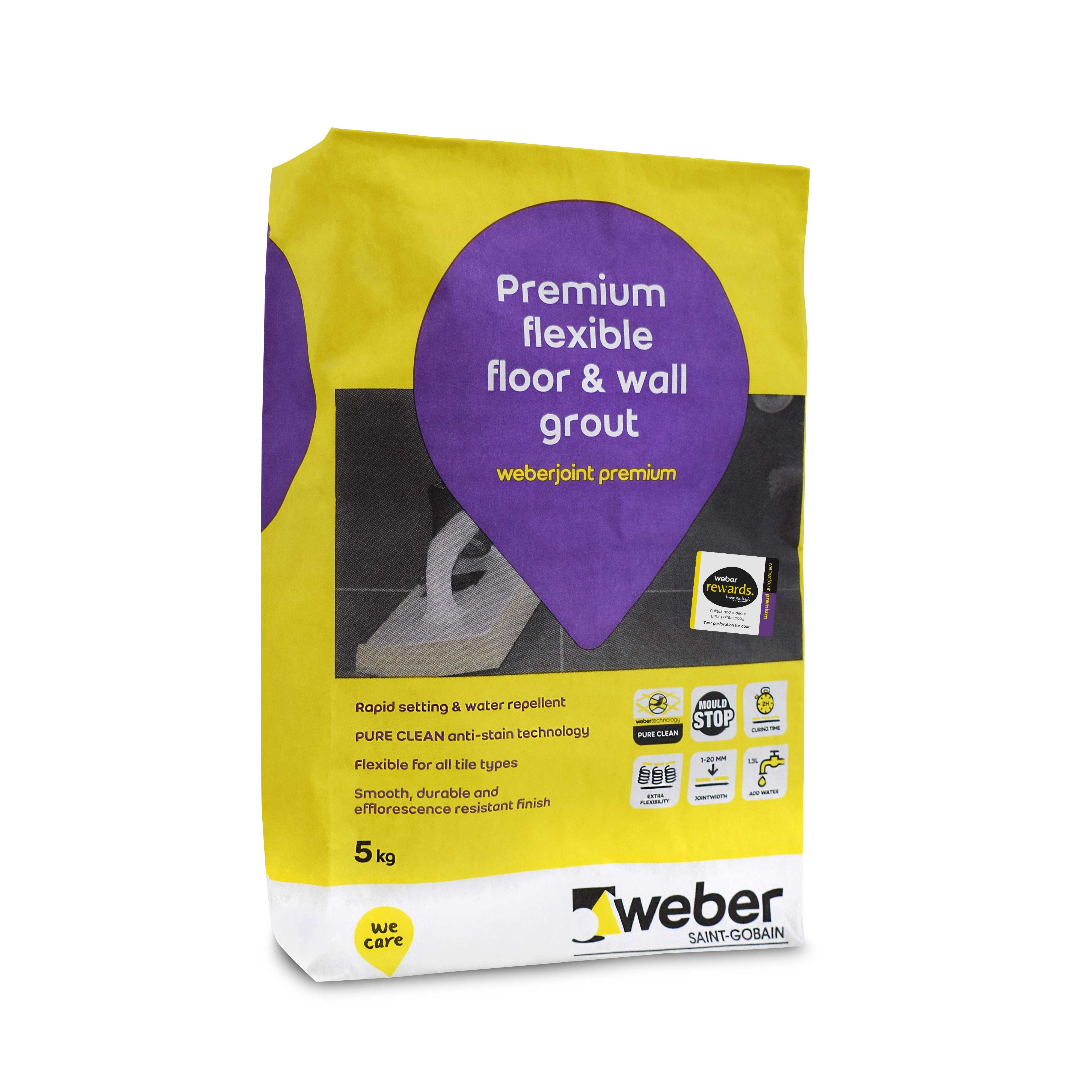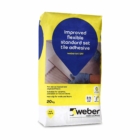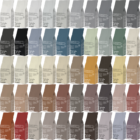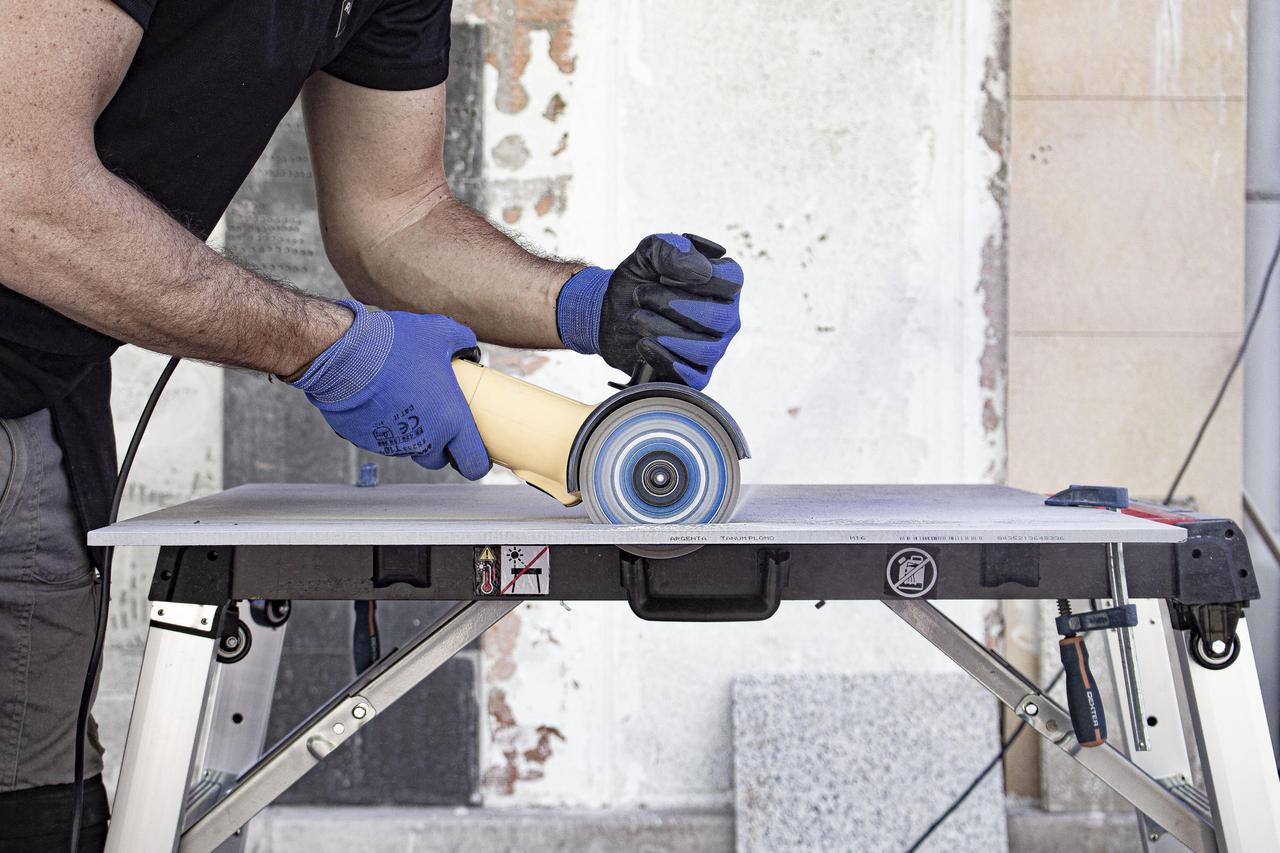Traditional Bathroom Tile Ideas – 20 clever ways to achieve the classic look
From Victorian-style to country-house-inspired, traditional bathroom style is attractive and timeless.
Traditional-style bathrooms are often influenced by elaborate Victorian designs, but many styles date back to much earlier times.
If you’re looking to create an authentic traditional-style bathroom, choosing the right tiles will be an essential part of the process. Unlike more modern, neutral styles, traditional tiles are available in an enormous range of sizes, colours, textures and patterns. Keep reading to discover how to give your bathroom the traditional touch.
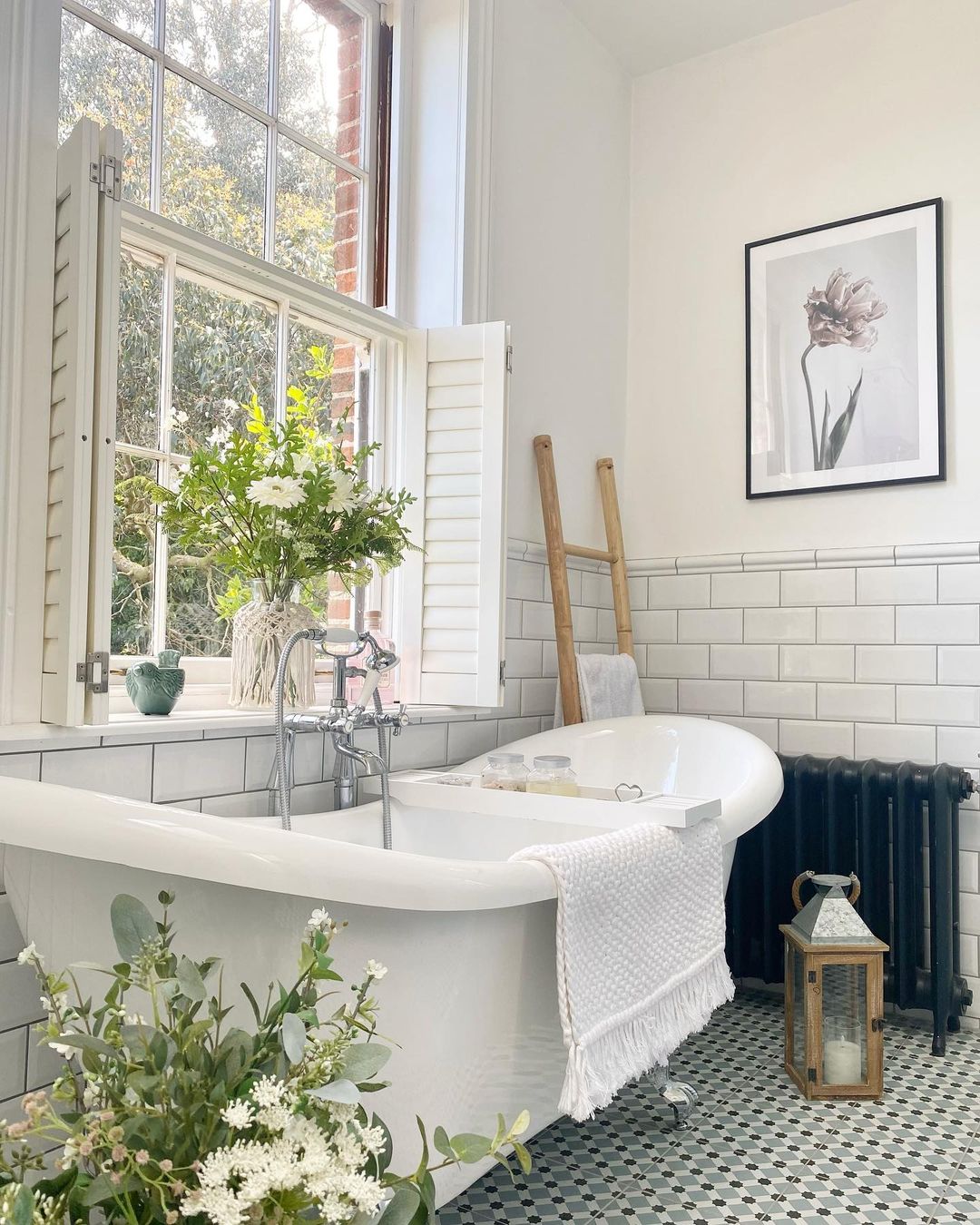
Image credit: @katesgeorgianhome
Recommended Tile: Dorset Bevelled Blanco
What are traditional style tiles?
From the ever-popular subway tiles to natural stone, miniature mosaics and intricate Victorian-style tile designs, traditional tiles come in all shapes and sizes.
The opposite of sleek and modernist, traditional style interiors often feature dark colours, eye-catching patterns and plenty of detailing. Traditional style is warm and inviting, often blending several design elements. It’s always well-put-together, elegant and, of course, timeless.
Traditional-style bathrooms often mix and match different tile types, for example, subway tiles on the walls and patterned tiles on the floor. Black and white tiles often feature heavily in classic bathrooms but green, blue, red, pink and multicoloured tiles can all be used to great effect.
Traditional-style bathroom tile ideas
It’s easy to give your bathroom a traditional twist with carefully chosen tiles. Whether you’re renovating a period property or want to add character and timeless style to a new build, we’ve rounded up some of the most inspiring traditional bathroom tile ideas:
Chequerboard floor tiles
One of THE most classic tile designs, the chequerboard pattern has been found on Bronze Age pottery pieces and ancient Egyptian hieroglyphics. Beloved by the Romans and favoured by the Victorians, this age-old tile layout is firmly ingrained in interior design.
The striking chequerboard floor pattern is traditionally black and white but can be changed up to include grey, blue and even red tiles. The layout of the tiles can dramatically alter the look of the room too, with the diagonal lay making a room look wider. You can also choose from small or large tiles and different materials, from marble to porcelain.
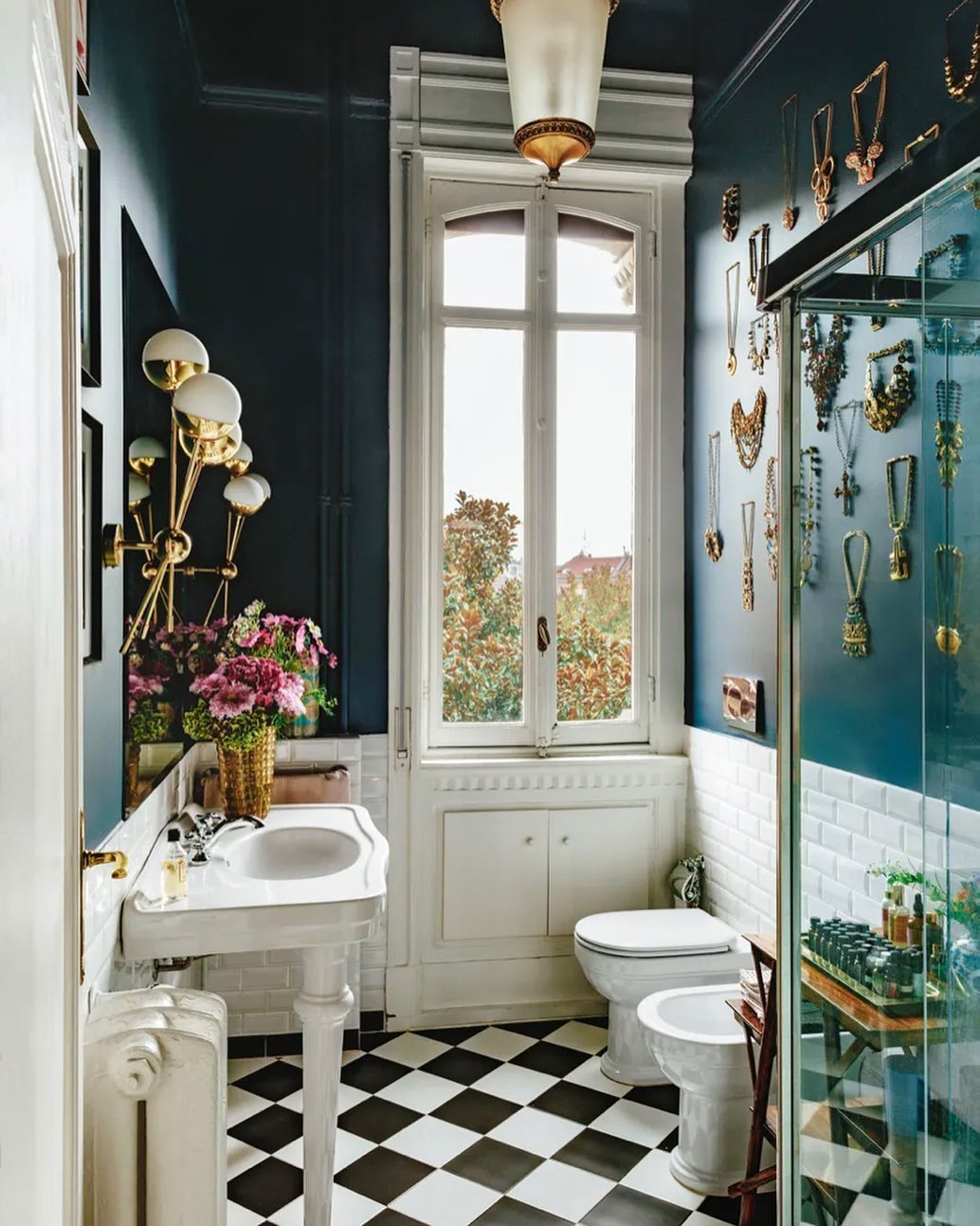
Image credit: @tindesign
Recommended Tile: St Andrews
Terracotta floor tiles
Terracotta has been used for construction, pottery and art since ancient times. Made from iron-oxide-rich clay which gives terracotta its distinctive red hue, the material is exceptionally durable and heat-retaining. Terracotta tiles are typically used for roofing and flooring and are perfect for adding a traditional feel to a room.
Terracotta tiles are baked at a lower temperature than many other tiles, making them more porous. They will need to be well-sealed when used on floors, especially in bathroom areas.
Penny floor tiles
Appearing in homes from the late 1900s onwards, penny tiles are wonderfully retro and perfect for use in traditional-style bathrooms. So-called because of their size, penny tiles are round or hexagonal and available in a wide range of colours and materials.
A brilliant choice for floors, penny tiles have excellent non-slip qualities. They’re also ideal for adding character to bathrooms as you can create your own patterns.
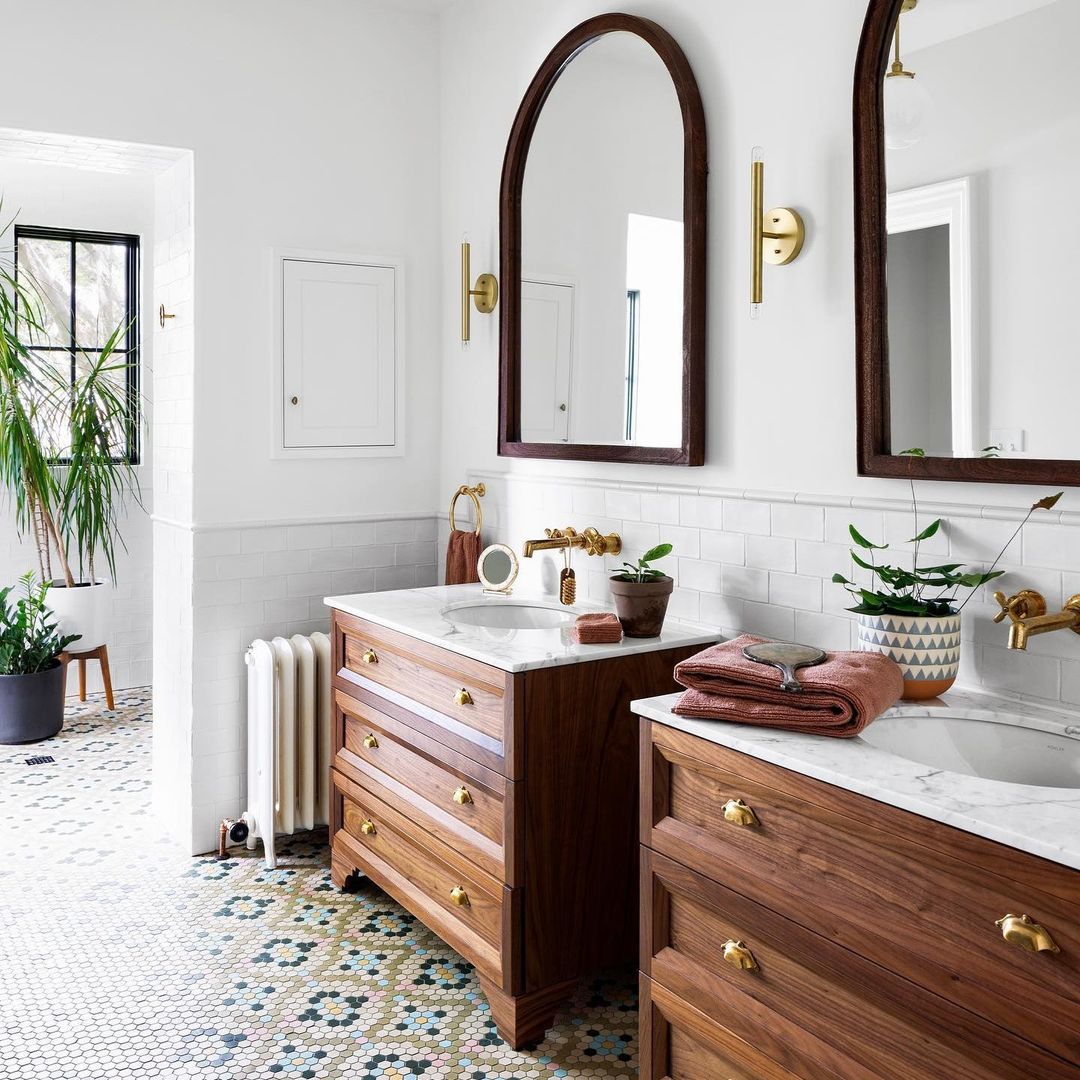
Image credit: @elmwoodcabinets
Recommended Tile: Chelsea
Metro tiles
One of the most popular tile styles, metro or subway tiles date back to Victorian times, when they first graced the walls of the subway in New York. Quickly finding their way into other subway stations, hospitals and then homes, this iconic tile was favoured for its stain-resistant and easy-to-clean properties.
Undeniably chic, metro tiles add a stylish, formal look wherever they are placed and are an ideal choice for traditionally-styled bathrooms. The sheer number of colours and possible layouts make this one of the most versatile tiles around. Try adding moulded borders and experimenting with grout colours for different looks.
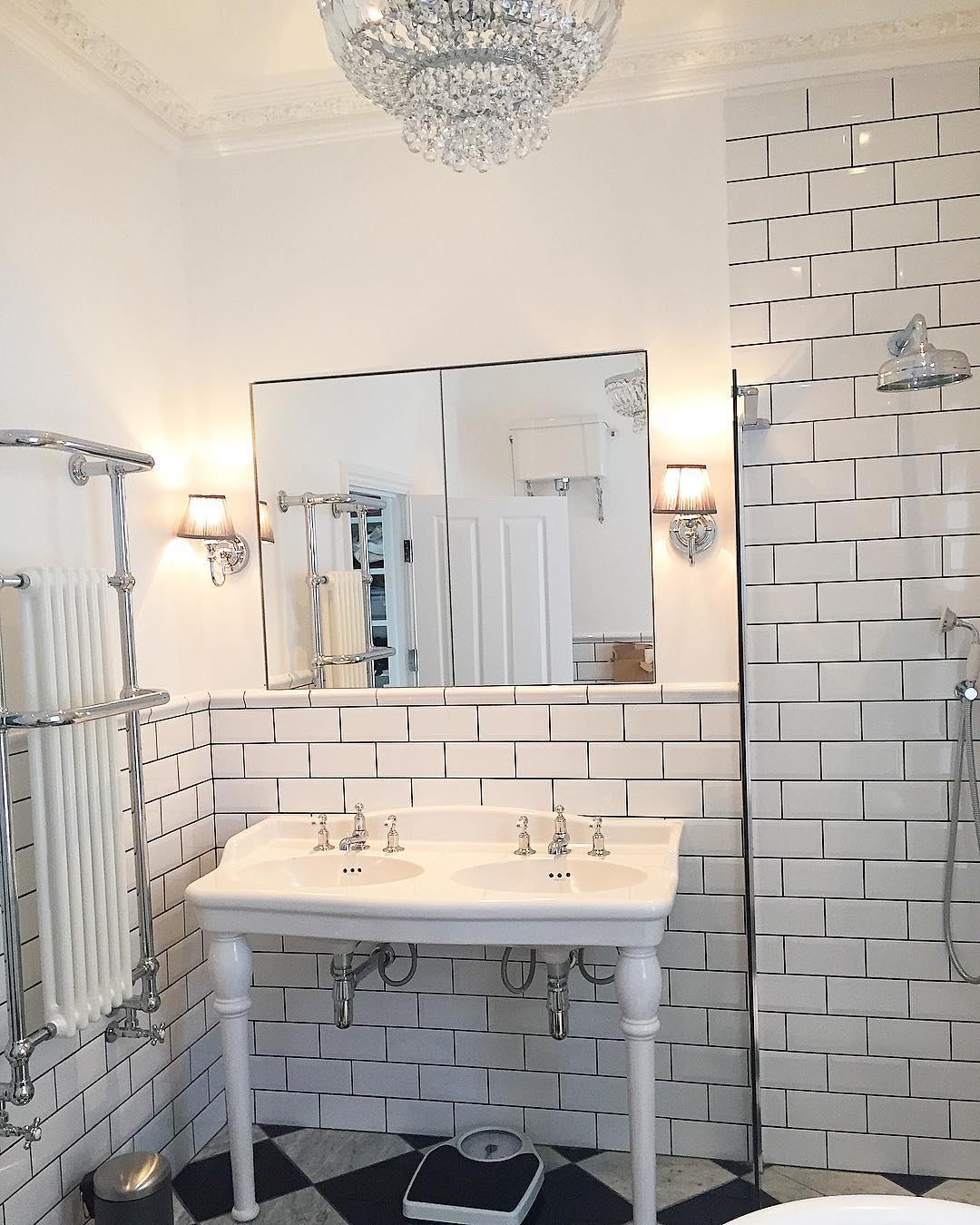
Image credit: @hearnehouse
Recommended Tile: Dorset Bevelled Blanco
Traditional tiles with a modern twist
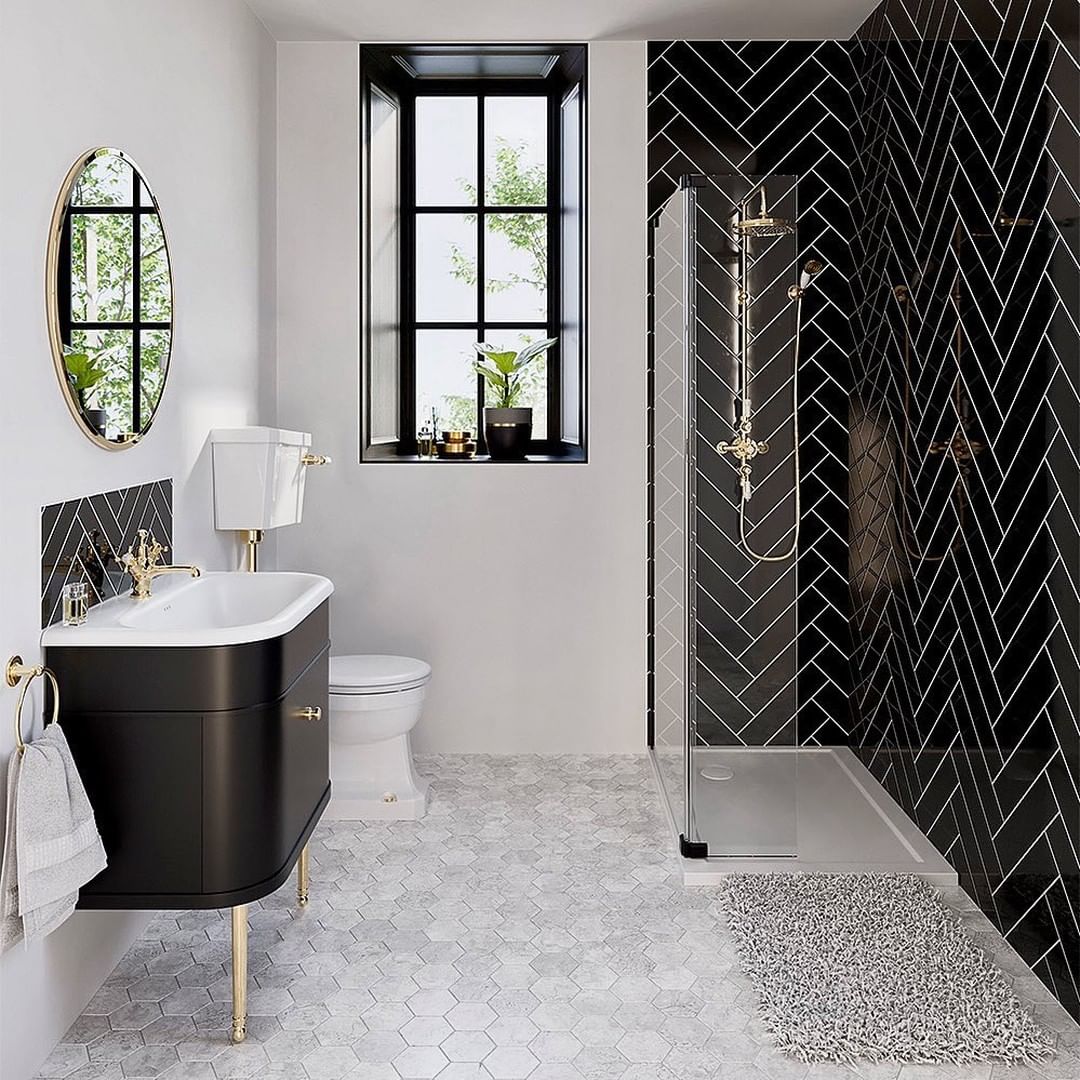
Give traditional tiles a modern twist with beautifully executed layouts. Subway tiles are traditionally laid in a brick bond, but you can try different layouts like herringbone, stacked or crosshatch for extra impact.
Image credit: @luxurybathroomdesign
Recommended Tile: Tinte
Classic octagon and dot tiles
Originating in the Victorian era, the octagon and dot tile pattern is a style classic. Adding a timeless floor tile design is one of the easiest ways to get the traditional look in your bathroom.
Octagon and dot floors are typically black and white, often the dot tiles are glossy in contrast to the more matt finish hexagonal tiles. If you prefer a warmer look, consider using beautiful sandy-hued, tumbled stone tiles
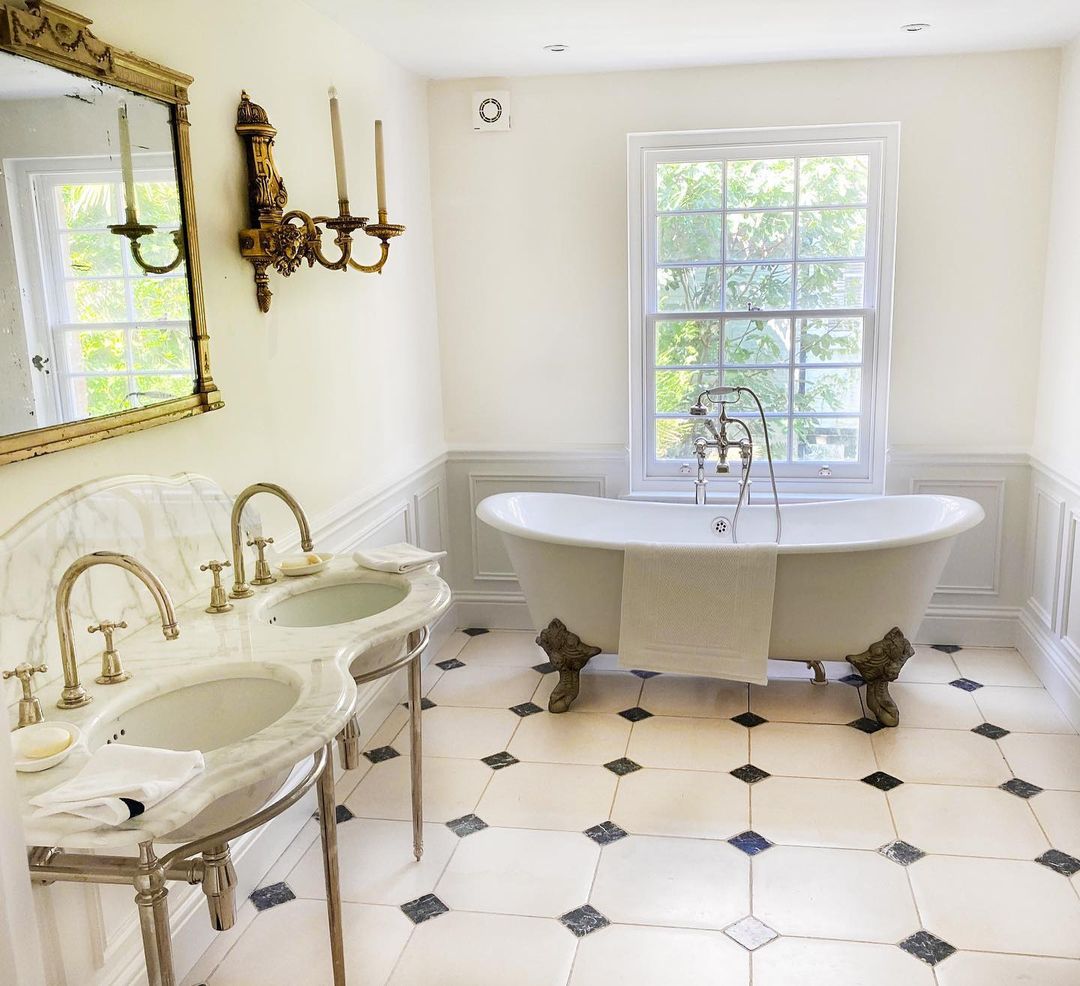
Image credit: @catchpoleandrye
Recommended Tile: Buckfastleigh
Textured tiles
If you want to add depth and interest to your bathroom walls, consider adding textured tiles. Embossed tiles are a great way to add subtle character to a room and are especially effective when used in specific areas. Pick designs with classic patterns for a traditional feel.
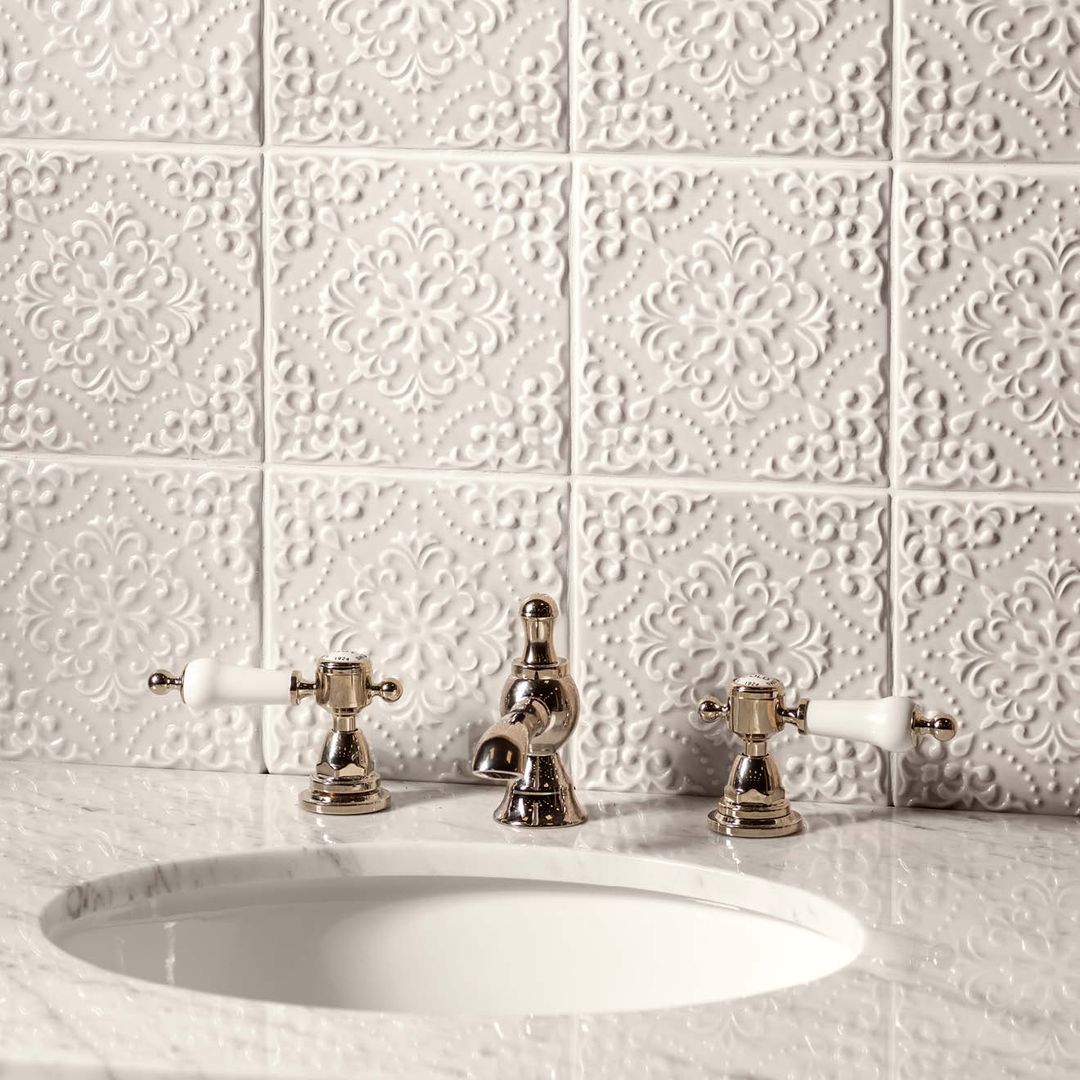
Image credit: @originalstyleuk
Marble tiles
Few materials radiate luxury like marble. Utilised by the ancient Greeks and Romans, marble is durable, beautiful and practical. Used initially for construction and sculptures, marble soon found its way onto the floors of palaces and cathedrals and eventually into our bathrooms and kitchens.
Although marble is often white with grey veins, there’s a huge variety of colours to choose from. Natural marble is suitable for use in bathrooms but will need sealing to keep it watertight and protect it from stains. You can also buy incredibly realistic marble-effect porcelain tiles.
Marble is one of the most classic choices for bathroom tiles, it’s an investment but it will last a lifetime and look as good in 50 years as it does today. Marble isn’t just limited to large format slabs, you can purchase a range of different-sized tiles, including mosaics.
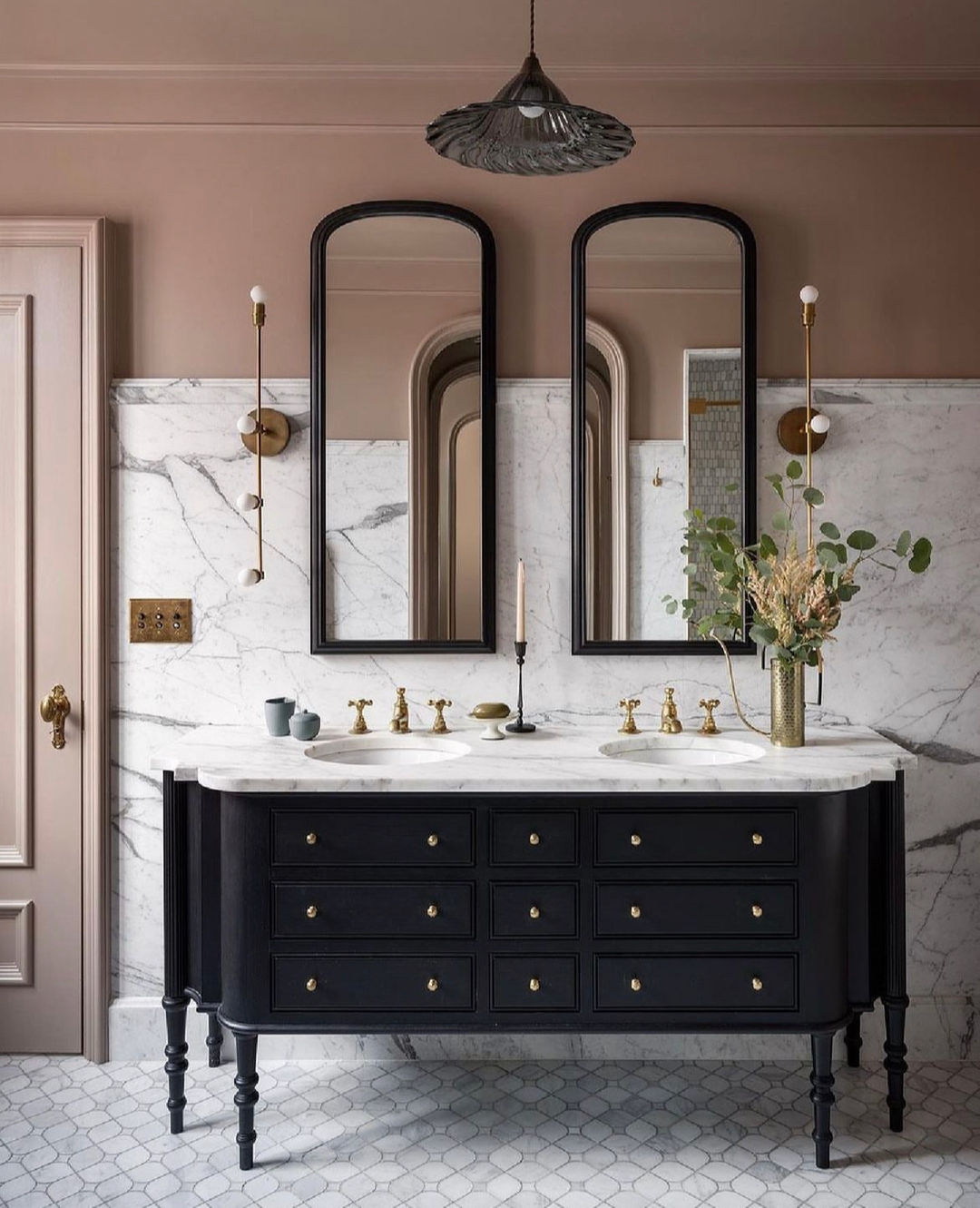
Image credit: @theinteriordesignassistantuk
Recommended Tile: Canaletto Gold Marble
Wooden floor tiles
Many traditional homes have wooden flooring throughout, including in the bathrooms. Although we wouldn’t advise fitting a natural wood floor in a room that comes into regular contact with water, wood-effect porcelain tiles are an excellent alternative.
Choose from a wide range of wood finishes to achieve a truly timeless look in your bathroom.
Recommended Tile: Woodlands
Square tiles with feature border
Simple square tiles are an understated but attractive addition to a bathroom. Break up a wall of square tiles by fitting retro Victorian-style border tiles, you can vary the tile colour too for added interest.
Like metro tiles, square tiles are a fantastic budget-friendly option and you’ll be able to choose from an enormous range of colours, sizes, finishes and textures.
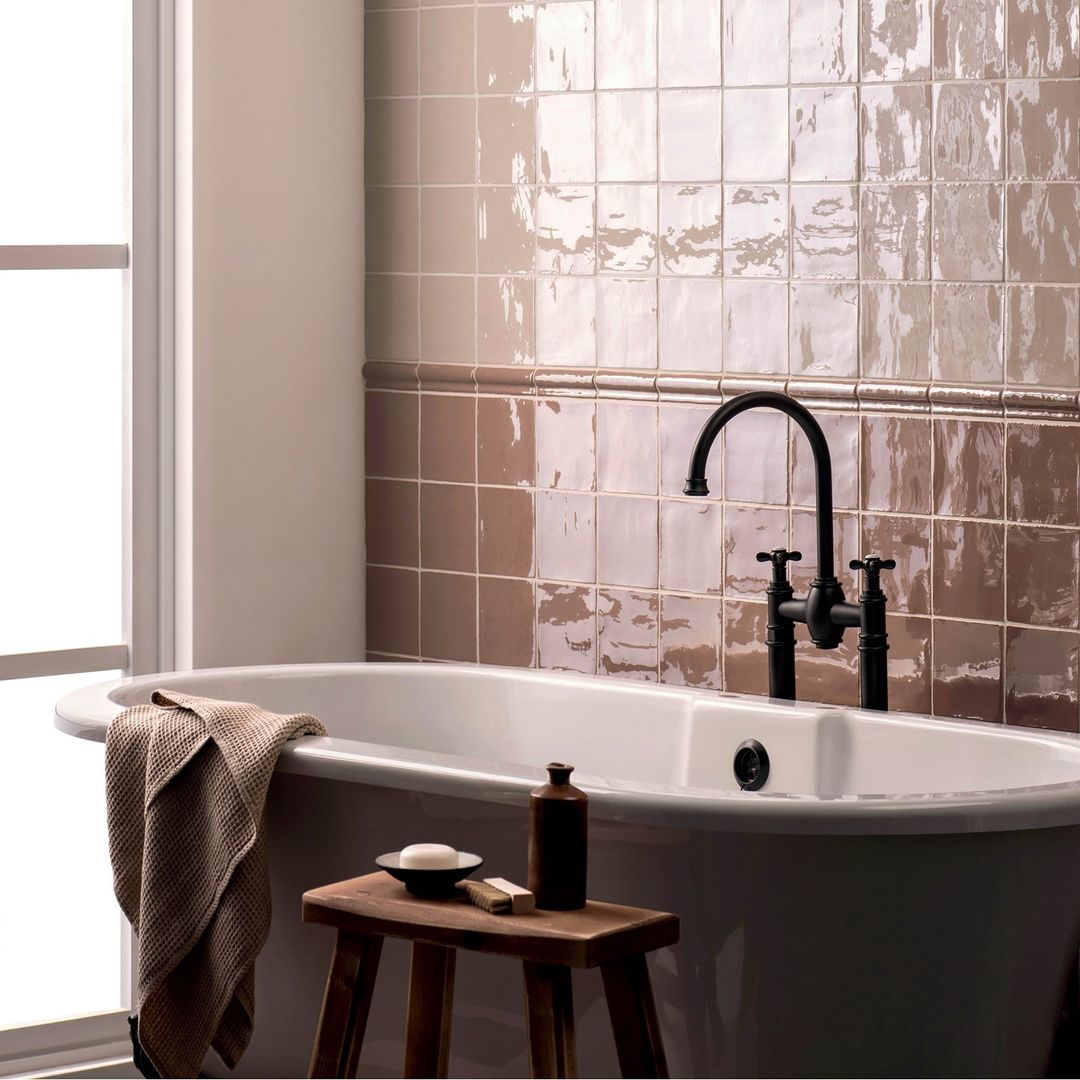
Image credit: @originalstyleuk
Recommended Tile: Dorset Woolliscroft
Victorian-style tiles
Victorian floor tiles are one of the most attractive options for a traditional-style bathroom. Influenced by the gothic buildings of the Middle Ages, these iconic tiles were mass-produced from the late 1800s, enabling homeowners to bring colour and beauty into their abodes.
There are many, many designs for Victorian floor tiles including the popular chequerboard, octagon and dot, Edison, Livingstone and Harvard designs. Borders play a big part in Victorian floor tile designs, the more elaborate, the better.

Image credit: @signaturehw
Recommended Tile: Blenheim
Travertine tiles
If you prefer a plainer design, it’s hard to beat real stone. Completely timeless, stone works as well in traditional-style bathrooms as it does in more modern designs.
Travertine is a type of limestone and is usually tan, cream or white in colour. It’s a great choice if you like a calming and neutral interior and its natural beauty and durability make it an excellent investment.
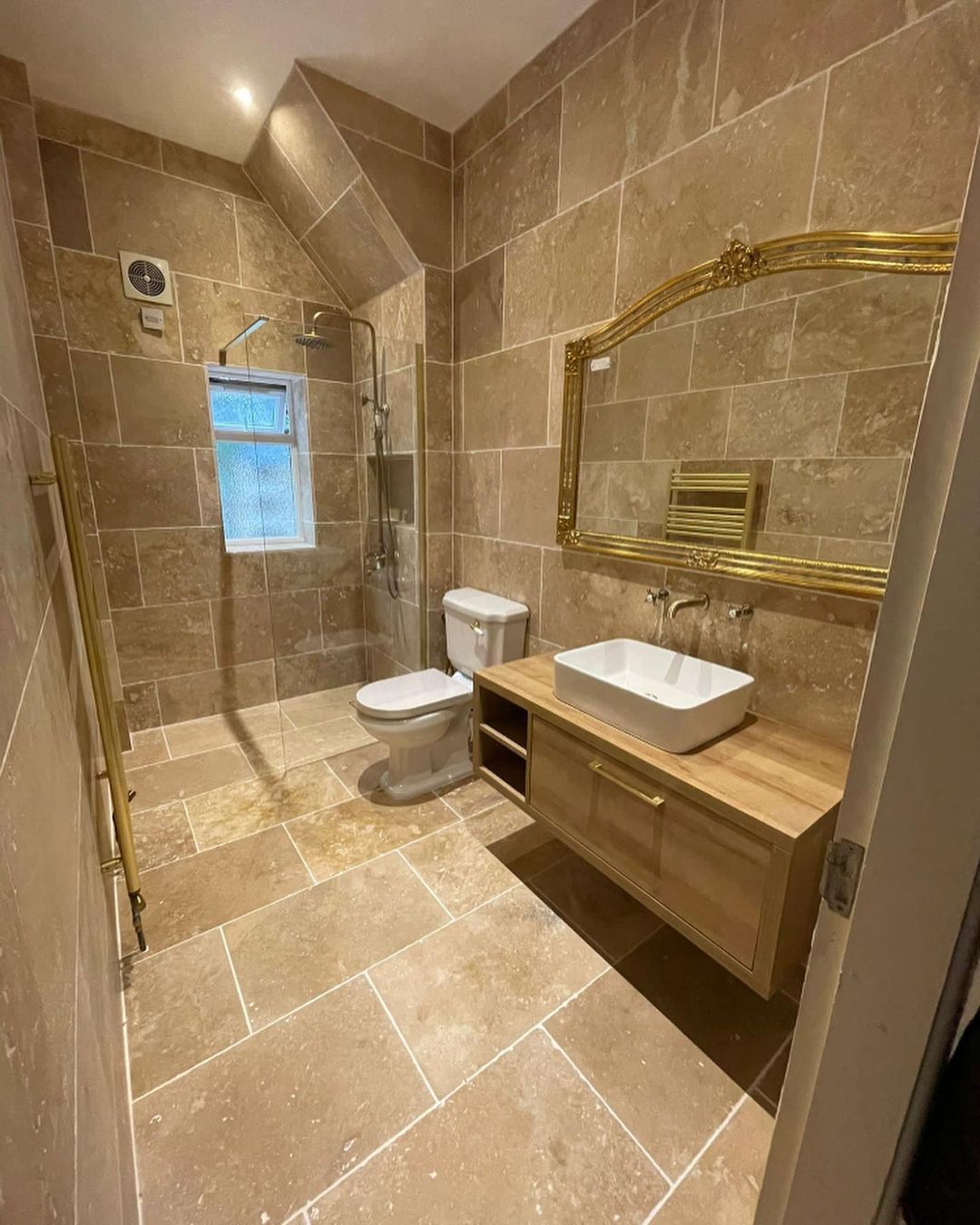
Image credit: @plushtiling
Recommended Tile: Travertine Classic Opus Mix
Hexagon tiles
Although hexagonal tiles might look like a modern design, they’ve been in vogue since the early 1900s. These eye-catching tiles are a fabulous choice for a traditional-style bathroom, you can choose from a wide range of sizes and materials and combine different colours for a striking look.
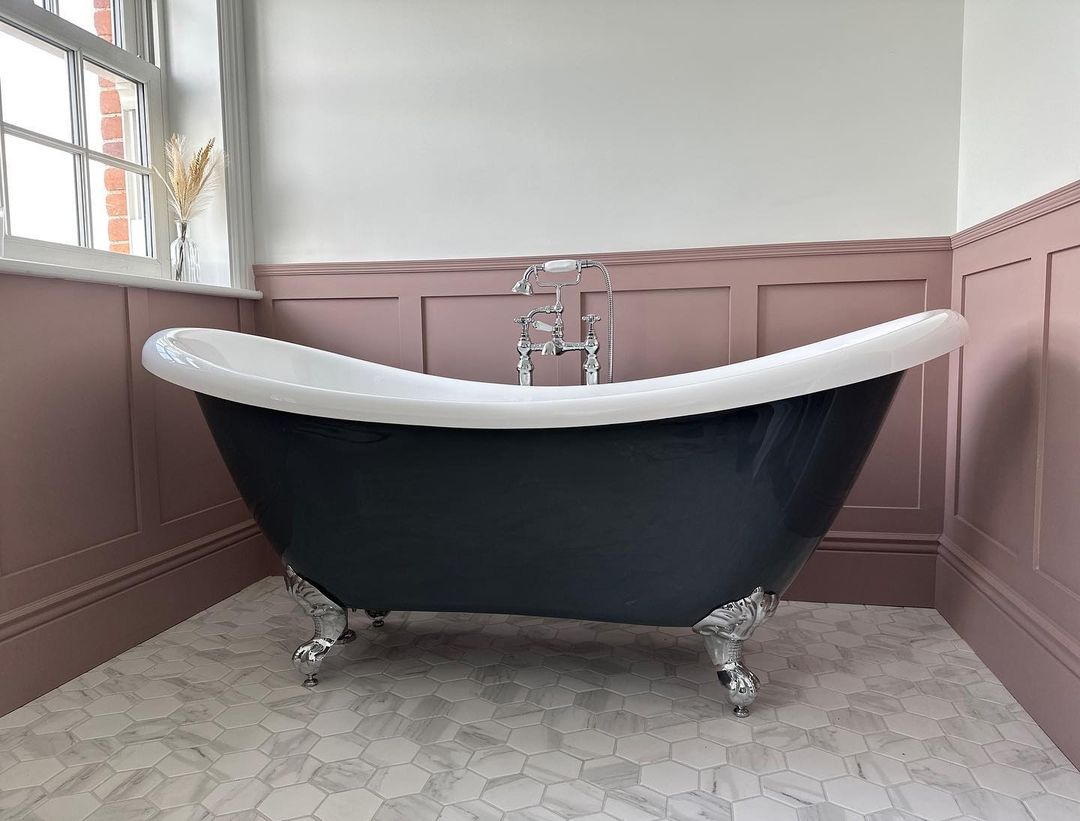
Image credit: @_old_court_house_
Recommended Tile: Ava
Black tiles
If you want to add a touch of drama and make a statement in your bathroom, using black tiles is one of the most effective ways to do so. Although cladding walls in black tiles may seem like a bold choice, it can completely transform the look and feel of a room. Black tiles are luxurious and sophisticated and perfect for achieving a classic look.
Pair black tiles with contrasting white tiles for the ultimate impact or add pops of colour, whatever you choose, we guarantee it’ll look fantastic.
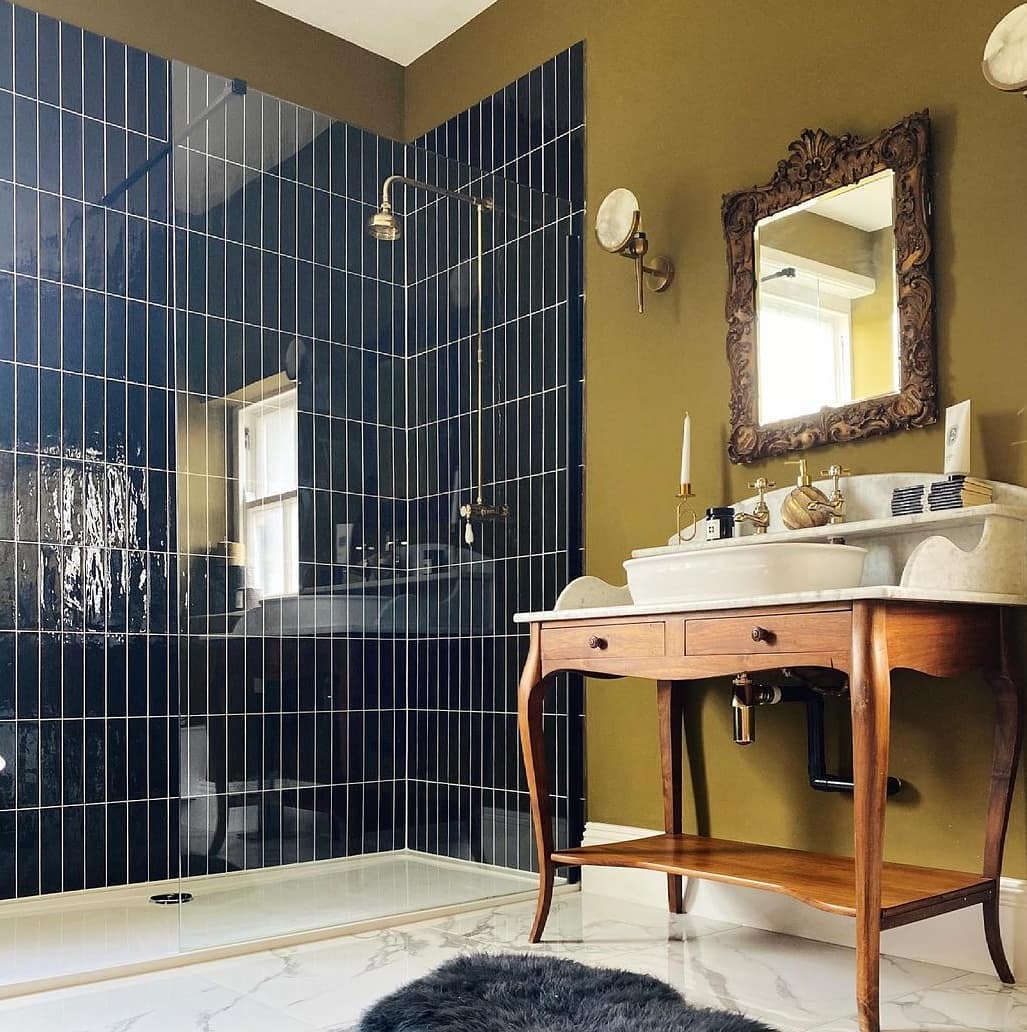
Image credit: @myvictorianhouselove
Recommended Tile: Pastel Gloss Black
Patterned tiles
One of the most effective ways to add traditional charm and character to a bathroom is by fitting patterned tiles. Opt for classic designs when you choose your tiles; floral prints and symmetrical designs are good choices.
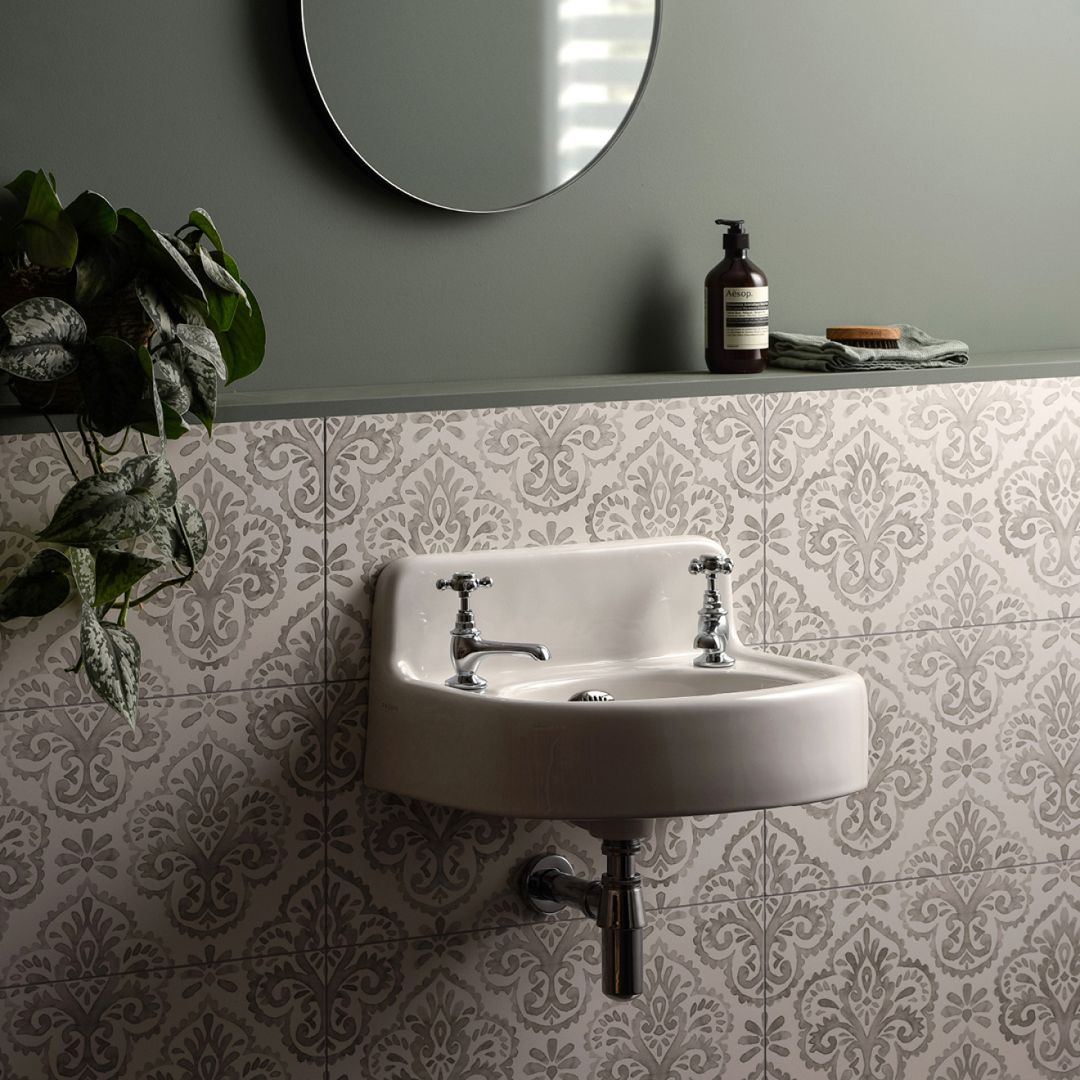
Image credit: @originalstyleuk
Recommended Tile: Damask
Mosaic tiles
One of the oldest forms of art, mosaics have been popular since the 3rd millennium BC. Used to embellish sculptures and create works of art, the ancient Greeks adorned their bathroom walls and floors with dainty cubes of glass, stone and shell.
As practical as they are beautiful, mosaics will add a classic look to any bathroom. Mosaic tiles are incredibly versatile and can be used throughout a room, or to highlight specific areas. You can also get creative with borders and patterns.
Recommended Tile: PJ series
Black and white floor tiles
Black and white is one of the most classic colour combinations and because it’s so popular, there’s a huge range of tile styles and patterns to choose from. As well as the striking Victorian-style floor tiles, bold Moroccan-inspired patterns are a great choice for a traditional-looking bathroom, adding interest and character.
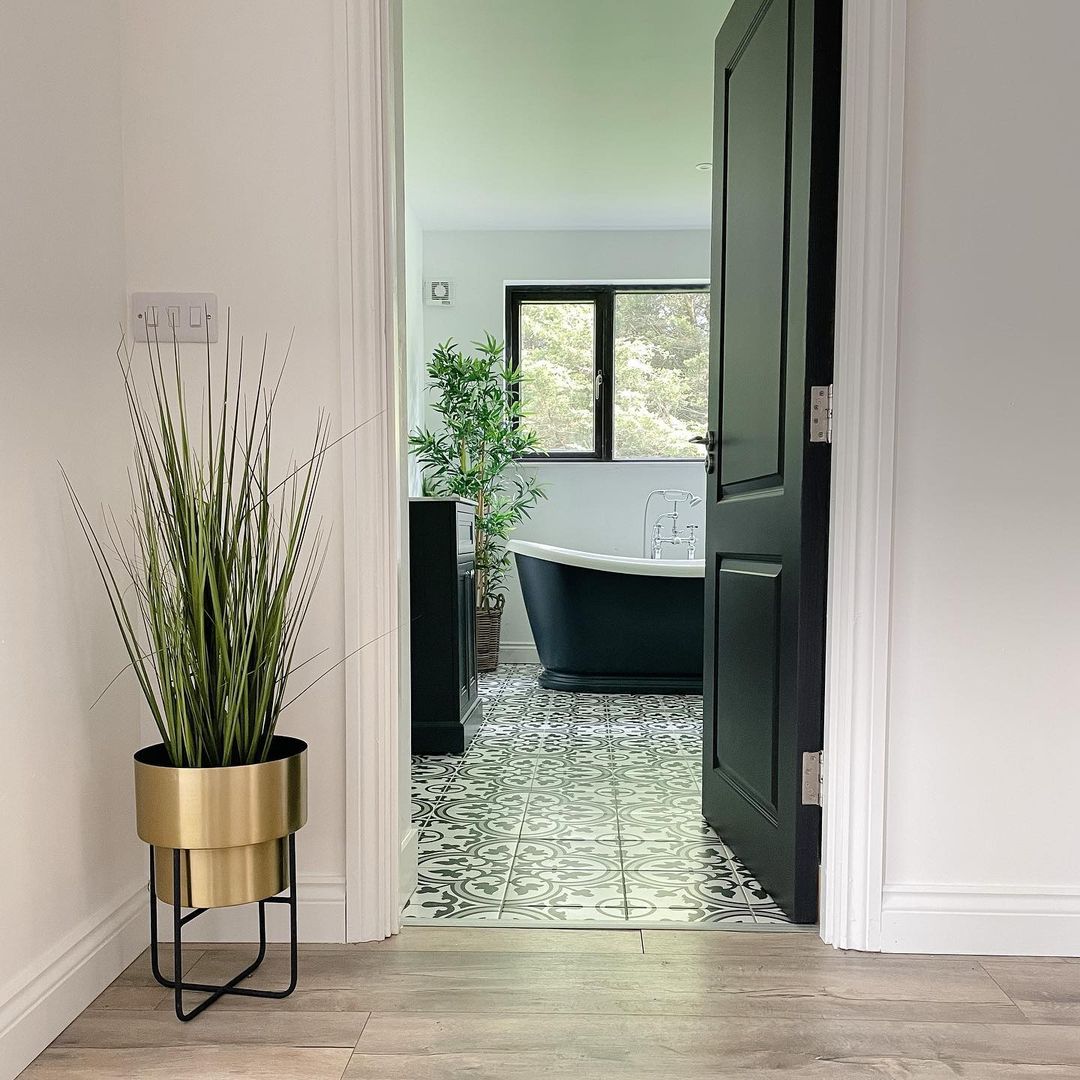
Image credit: @peony_rose_home
Recommended Tile: Damask Decor 01
Decorative border tiles
When it comes to designing a traditional-style bathroom, less isn’t always more. Take inspiration from the Victorians and add interest with beautifully patterned border tiles and different colours.
Whether embossed or heavily patterned, decorative tiles are perfect for adding age-old charm to a bathroom.
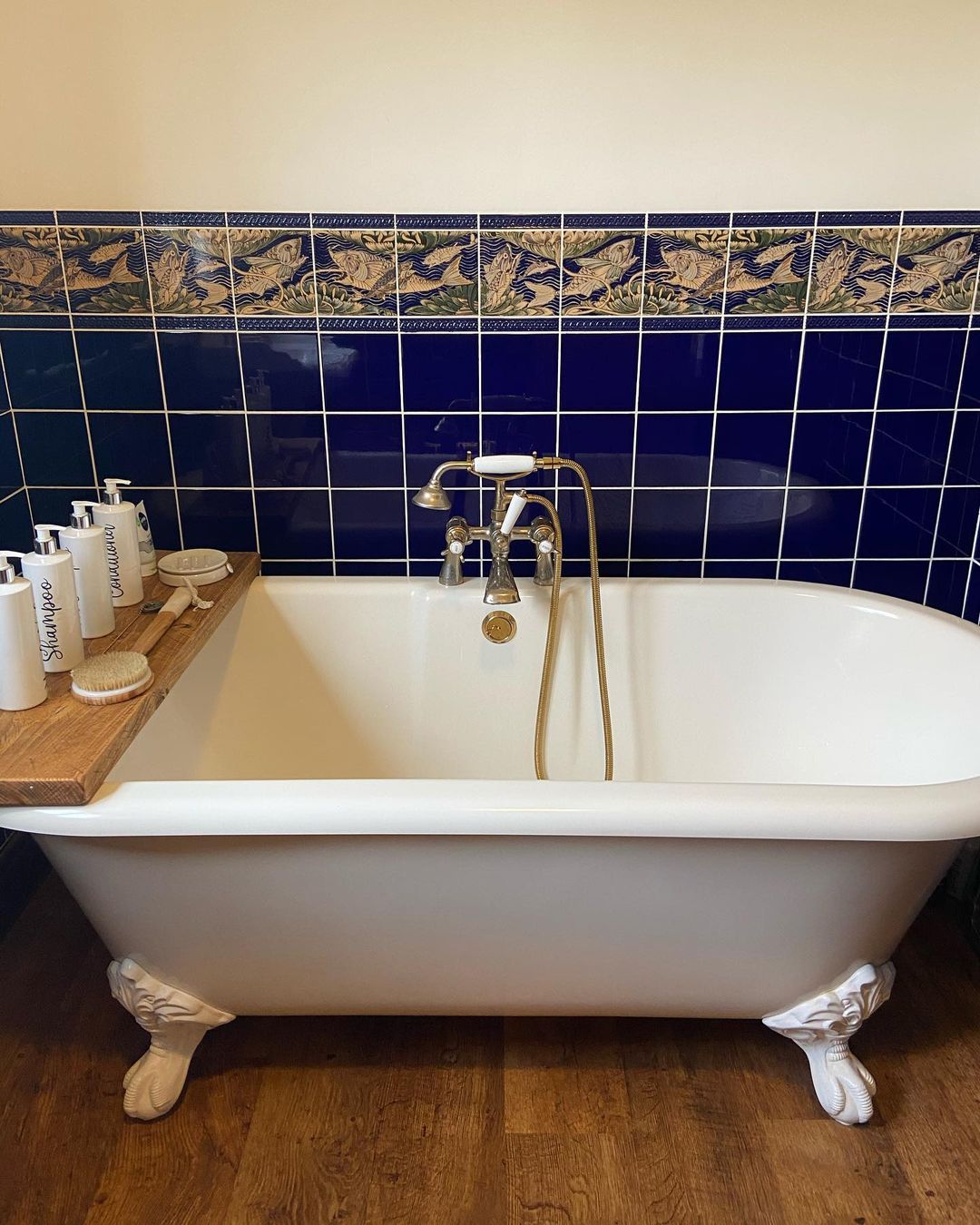
Image credit: @le_petit_cleaning_co
Recommended Tile: Emilia Navy
Matching wall and floor tiles
Although bold colours and unusual details can play a big part in designing a traditional bathroom, there’s always a place for coordinating wall and floor tiles. Opt for materials like marble or limestone (or the porcelain equivalents) for an elegant and timeless feel.

Image credit: @mjhousetohome
Recommended Tile: Viano White Polished Marble
Star tiles
Vintage star tiles are perfect for adding character to a traditionally themed bathroom. These porcelain tiles are extremely durable and easy to maintain and look as fantastic gracing the walls as they do on the floors.
Change the look by opting for white stars on black, or black stars on white, a classic colourway that will easily stand the test of time.
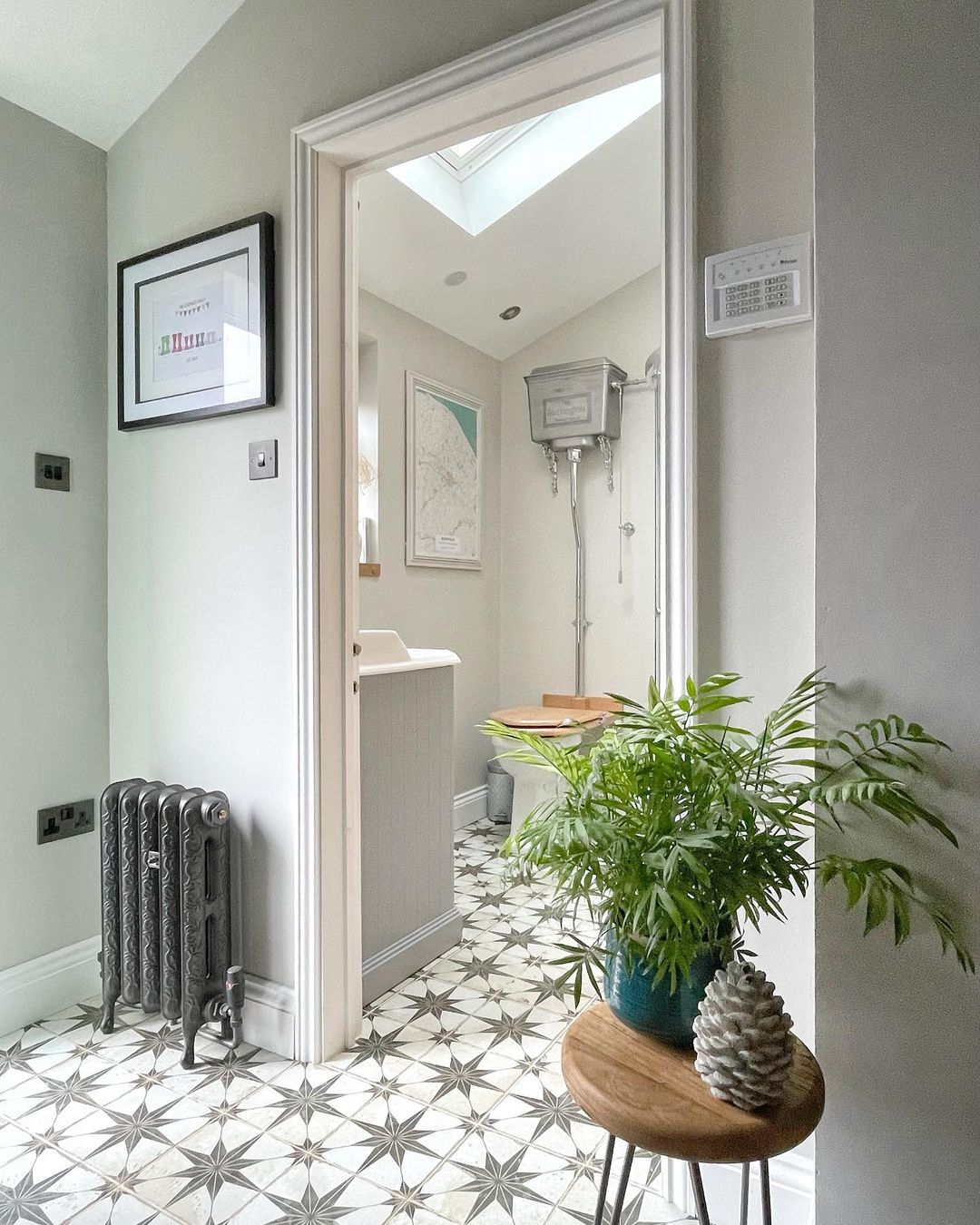
Image credit: @_maple_house
Recommended Tile: Regal Negro
Traditional bathroom tile tips
- Take inspiration from the Victorians and opt for glossy wall tiles with beautiful borders, or heavily patterned floor tiles.
- Using timeless, natural materials like limestone and marble will instantly help you to create a traditional-looking bathroom.
- When it comes to a traditional colour scheme, there aren’t really any rules. You can go bold with striking black or deep shades of blue, red or green, or keep it lighter with classic grey, white and beige tones.
Atlas Ceramics has an extensive range of traditional-style tiles to choose from. Browse our selection yourself or call one of our experts for advice.


